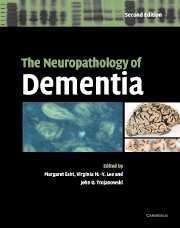Book contents
- Frontmatter
- Contents
- List of contributors
- List of abbreviations
- Preface to second edition
- 1 Definition, clinical features and neuroanatomical basis of dementia
- 2 Important anatomical landmarks in the brain in dementia
- 3 Practical approach to pathological diagnosis
- 4 Morphometric methods and dementia
- 5 Safety precautions in laboratories involved with dementia diagnosis and research
- 6 Molecular diagnosis of dementia
- 7 Neuropathology of the ageing brain
- 8 Neuroimaging Alzheimer's disease
- 9 Alzheimer's disease
- 10 Down's syndrome and Alzheimer's disease
- 11 Sporadic tauopathies: Pick's disease, corticobasal degeneration, progressive supranuclear palsy and argyrophilic grain disease
- 12 Hereditary tauopathies and idiopathic frontotemporal dementias
- 13 Vascular dementias
- 14 Familial and sporadic cerebral amyloid angiopathies associated with dementia and the BRI dementias
- 15 Parkinson's disease, dementia with Lewy bodies, multiple system atrophy and the spectrum of diseases with α-synuclein inclusions
- 16 Huntington's disease
- 17 Human prion diseases
- 18 Alcoholism and dementia
- 19 Hydrocephalus and dementia
- 20 Head injury and dementia
- 21 Infectious (and inflammatory) diseases causing dementia
- 22 Schizophrenia and its dementia
- 23 Other diseases that cause dementia
- 24 Transgenic mouse models of neurodegenerative disease
- Appendix: Dementia brain banks
- Index
11 - Sporadic tauopathies: Pick's disease, corticobasal degeneration, progressive supranuclear palsy and argyrophilic grain disease
Published online by Cambridge University Press: 12 October 2009
- Frontmatter
- Contents
- List of contributors
- List of abbreviations
- Preface to second edition
- 1 Definition, clinical features and neuroanatomical basis of dementia
- 2 Important anatomical landmarks in the brain in dementia
- 3 Practical approach to pathological diagnosis
- 4 Morphometric methods and dementia
- 5 Safety precautions in laboratories involved with dementia diagnosis and research
- 6 Molecular diagnosis of dementia
- 7 Neuropathology of the ageing brain
- 8 Neuroimaging Alzheimer's disease
- 9 Alzheimer's disease
- 10 Down's syndrome and Alzheimer's disease
- 11 Sporadic tauopathies: Pick's disease, corticobasal degeneration, progressive supranuclear palsy and argyrophilic grain disease
- 12 Hereditary tauopathies and idiopathic frontotemporal dementias
- 13 Vascular dementias
- 14 Familial and sporadic cerebral amyloid angiopathies associated with dementia and the BRI dementias
- 15 Parkinson's disease, dementia with Lewy bodies, multiple system atrophy and the spectrum of diseases with α-synuclein inclusions
- 16 Huntington's disease
- 17 Human prion diseases
- 18 Alcoholism and dementia
- 19 Hydrocephalus and dementia
- 20 Head injury and dementia
- 21 Infectious (and inflammatory) diseases causing dementia
- 22 Schizophrenia and its dementia
- 23 Other diseases that cause dementia
- 24 Transgenic mouse models of neurodegenerative disease
- Appendix: Dementia brain banks
- Index
Summary
INTRODUCTION
Argyrophilic cytoplasmic neuronal and glial inclusions are characteristic of a number of sporadic neurodegenerative disorders, including Pick's disease (PiD), corticobasal degeneration (CBD), progressive supranuclear palsy (PSP) and argyrophilic grain disease (ADG), that collectively are referred to as tauopathies (Lee et al., 2001). At the electron microscopic level inclusions in the tauopathies are non-membrane-bound filamentous aggregates composed of the microtubule-associated protein tau. The tau in the inclusions is abnormal in a number of respects, not the least of which is its fibrillar state. Tau is normally a soluble protein that is unstructured and resistant to heat and strong acids. It binds to microtubules and promotes polymerization and stabilization of microtubules. The functional attributes of tau are regulated by phosphorylation, with phosphorylated forms of tau having decreased ability to promote microtubule stability (Spillantini & Goedert, 1998; Delacourte & Buee, 1997). Fibrillar tau is abnormally phosphorylated with far more phosphate groups than normal tau. There are approximately 20 phosphorylation sites on tau and multiple kinases that are capable of phosphorylating tau. The degree of phosphorylation of the various sites contributes to great microheterogeneity in tau within the brain (Spillantini & Goedert, 1998).
In human adult brain, alternative mRNA splicing of a single gene on chromosome 17 yields six major tau isoforms (Goedert et al., 1989a, 1995; Delacourte & Buee, 1997). Exons 2, 3 and 10 are alternatively spliced. Alternative splicing of exon 10 gives rise to tau isoforms with three (exon 10-) or four (exon 10+) conserved 30–32 amino acid repeats in the microtubule-binding domain, so-called three repeat tau (3R tau) and four repeat tau (4R tau).
- Type
- Chapter
- Information
- The Neuropathology of Dementia , pp. 227 - 256Publisher: Cambridge University PressPrint publication year: 2004
- 16
- Cited by



